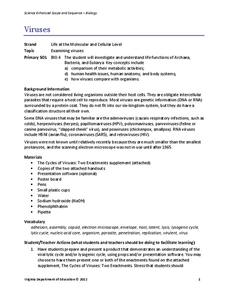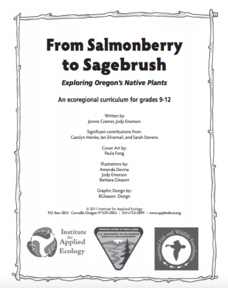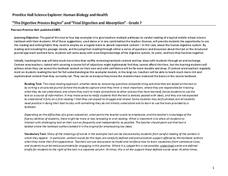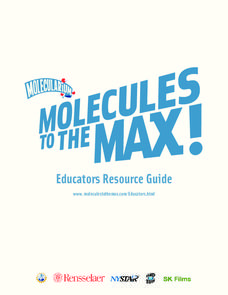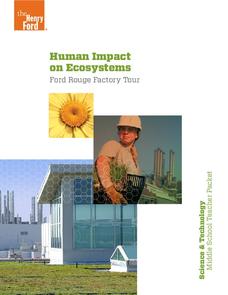Virginia Department of Education
Viruses
Germs, parasites, and viruses, oh my! Facilitate a lesson on viruses as individuals explore functions of Archaea, Bacteria, and Eukarya. They learn how viruses compare with other organisms in nature and how they contribute to health...
Brooklyn Children’s Museum
Volcanoes!
Give young geologists an up close and personal look at volcanoes with a series of hands-on earth science lessons. Whether they are investigating the properties of igneous rocks, building their own volcanoes, or making fudge to model the...
PBS
Breaking it Down
After challenging themselves to correctly choose the form of erosion and length of time required for a given landform to develop, earth science class members model mechanical and chemical weathering with various lab demonstrations over...
Polar Bears International
Taking Action!
Motivate young scientists to stand up and take action with this environmental science lesson. To begin, the class works in small groups brainstorming actions that support the conservation of the earth before creating and implementing an...
Sea World
Arctic Animals
Discover the coldest animals in the world with a lesson about the Arctic habitat. Kids use a glossary and information sheet about animals found in the Arctic Circle to complete several activities, including tracking the lemming...
Institute for Applied Ecology
From Salmonberry to Sagebrush - Exploring Oregon’s Native Plants
Take a deep dive into Oregon's ecosystems, plants, and changes from the past to the future. Many hands-on activities in an environmental science unit delight scholars, including creating a field guide for a local park. The in-depth study...
Savvas Learning
"The Digestive Process Begins" and "Final Digestion and Absorption"
Want your class to digest text more thoroughly? Middle schoolers learn about the digestive system in the lesson and reinforce informational text reading skills through a variety of strategies. They engage in a close reading approach,...
NOAA
A Day in the Life of an Ocean Explorer
What's life like aboard an ocean exploration vessel? Junior oceanographers examine the important role of communication in ocean research in lesson two of a five-part series from NOAA. The materials introduce the class to life on board...
Kenan Fellows
Electricity: Sources, Usage, Challenges, and the Future
What does the future of energy look like? Junior engineers collaborate to discover a solution to the global energy crisis during a very hands-on lesson. The unit focuses on learning through collaboration to develop a deep understanding...
Alliance Theater
The Jungle Book Post-Show STEAM Lesson
An ecosystem is really just the flow of energy through many different living organisms. A study of Rudyard Kipling's The Jungle Book leads to an environmental science activity in which learners study how various factors can affect...
National Nanotechnology Infrastructure Network
Big vs. Little - Macro to Micro Lesson 1
Small and large are relative terms; what's the best way to quantify them? Young scientists take on that challenge as they complete an interactive activity to explore size. They build structures during their exploration and begin using...
Virginia Department of Education
The Cell Cycle and Mitosis
What a packed lesson plan! Provide your class with the opportunity to learn about the cell cycle in several exciting ways. Biologists first learn about the theory behind mitosis, then proceed to view onion tips under the microscope and...
K20 LEARN
A Trait Accompli: An Introduction to Mendelian Genetics
Young scientists learn the laws of genetics through data collection and research. They use discussions and online resources to develop an understanding of the related vocabulary.
Curated OER
Volcanoes: Fourth Grade Lesson Plans and Activities
Young geologists begin exploring volcanoes of different structures and states: active, extinct, or dormant. During the lab, they make three models and compare different types of volcanoes, including composite, cinder cone, and shield....
Curated OER
Volcanoes: Kindergarten Lesson Plans and Activities
In the pre-lab, kindergarteners mimic the movements of the eruption of a volcano and discover various volcanoes around the United States. Then, pupils sort different types of volcanic rocks in the lab before learning how volcanoes grow...
It's About Time
The Fossil Record
What do you call a plated dinosaur when he is asleep? A stego-snorus! Through four hands-on activities, young paleontologists rotate through stattions to learn about preservation in rock, resin, ice, and conservation of animal tracks....
Rensselaer Polytechnic Institute
Molecules to the Max!—Educators Resource Guide
From molecules to nanotubes, an engaging unit explores the world of tiny science. Fifteen hands-on experiments and lessons engage young scientists as they learn chemistry. Discussions, worksheets, and data analysis reinforce the concepts...
Curated OER
Hazards: Kindergarten Lesson Plans and Activities
The last unit in the series allows kindergarteners to see the dangers and hazards associated with each of the natural disasters learned so far in the series—earthquakes and volcanoes. They listen to sounds associated with the disasters.
It's About Time
Refraction of Light
Don't shine like a diamond, refract light like a diamond. Young scientists use an acrylic block and a laser light to observe refraction. Advanced scholars figure the sine of the angles of reflection and incidence as well as mastering...
Code.org
Star Wars: Building a Galaxy with Code
Welcome to the code side. The interactive lesson introduces coding in a game format with familiar characters. Young computer experts learn to develop code to control the interaction of the characters in the game. The activity ends with...
Norwich Institute for Language Education
Simple Machines
Planning a unit on simple machines? Save some time and energy with this collection of lessons and activities that explores how these devices are used in the real world to make life a little easier.
Henry Ford Museum
Human Impact on Ecosystems
An environmenta science unit includes three lessons plus a cumulative project covering the ecosystem. Scholars follow the history of the Ford Rouge Factory from its construction on wetlands and how it destroyed the environment to its...
Centers for Disease Control and Prevention
Teach Mrs. Jones' Class about Microbes
During a biology lesson, scholars research microbes, design a lesson plan using an outline, and present the lesson to the class.
Columbus City Schools
Get Your Organisms Organized
From large to small, show your class how to organize them all! Included within the guide is everything you need to take their knowledge of classification from the cellular to the species level. The worksheets focus on building vocabulary...


